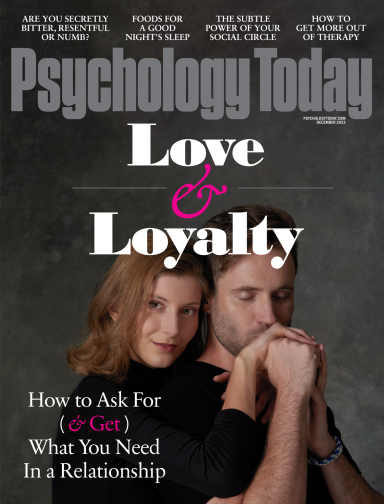COLD PEOPLE
Verified by Psychology Today

Attachment
Cold People: What Makes Them That Way? Part 1
Emotionally unavailable moms prompt their children to be “avoidantly attached.”
Posted May 31, 2011 | Reviewed by Lybi Ma
THE BASICS
- What Is Attachment?
- Take our Your Mental Health Today Test
- Find a therapist to strengthen relationships
Key points
- Those who are “avoidantly attached” can be impersonal, guarded, or even self-absorbed, among other traits.
- Avoidant attachment should not be confused with either introversion or autism.
- Those who develop traits of avoidant attachment tend to have mothers who were emotionally unavailable.

Source: Woman, Portrait, Model / Pixabay
Doubtless, you’ve had the experience of interacting with someone who was, we’ll say, off-puttingly standoffish. Detached, seemingly preoccupied, and not at all open or friendly, they seemed to hold you at a distance. And if you tried to say something to ease the situation, their response (though not exactly inappropriate) pretty much nullified your efforts.
Or, you may have begun a romantic relationship that started out promising, but over time compelled you to confront the fact that the other person really wasn’t letting you in. Despite all your attempts to “grow” the connection, to make it more mutual and heartfelt, he or she seemed to prefer that it remain as it began—uncommitted, relatively superficial, and impersonal. Any natural progression toward greater intimacy (at least emotional intimacy) simply wasn’t happening. And trying to cultivate more patience, to cut the other person more slack, or make allowances for their perhaps having an especially “private” nature, ultimately didn’t seem to make any difference in your feeling uncomfortably removed from them.
Hopefully, this is a relationship you walked away from. Odds are that in both cases I’ve portrayed, you were dealing with a person who might best be understood as having what in developmental psychology is called an avoidant attachment pattern.
This most useful concept—introduced into the literature by Mary Ainsworth who, along with her mentor, John Bowlby, represent the chief pioneers in the vital field of attachment theory—focuses on the nature of children’s attachment to their earliest caregiver as it crucially shapes how they’ll relate to others later in life.
article continues after advertisement
Here, bulleted, are some words and phrases that collectively capture, on the surface at least, the various dimensions of the “characterological coldness” I’ve been depicting (though, of course, no single individual is likely to manifest all these features):
- Aloof, apart, standoffish
- Impersonal, disengaged, uninvolved; closed, shut-down
- Detached, distant, remote (these traits, like so many others on this list, actually characterize a schizoid personality disorder, which—at their extreme—cold people can sometimes be)
- Haughty, or projecting superiority (though, if these narcissistic features are present, they could reflect the individual’s outward demeanor, or self-deception, far more than how—deep down—they actually see themselves)
- Self-absorbed; insulated, passively withdrawn
- Emotionally unavailable, inaccessible, unresponsive, indifferent, uninvested
- Unfeeling, unemotional, affectionless; unsmiling—straight-faced (or stone-faced)
- Cold-hearted, as in “cold fish” or (even worse) an “iceberg” or “ice queen”
- Lacking empathy and compassion
- Untrusting, wary, guarded
- Angry, hostile; critical
- Excessively independent and self-reliant
Before looking at the maternal caretaking causes of such coldness, however—as well as its short and longer-term psychological effects—I should briefly mention what avoidant attachment is not.
For one thing, avoidant attachment shouldn’t be confused with introversion (presently understood as an inborn personality trait tied to the brain’s reticular activating system). Given similar deficits in their parenting, extroverts are no less prone toward developing this same kind of dysfunctional attachment pattern. Rather, introverts need to be appreciated not so much as aloof or emotionally unresponsive (as compared to extroverts), but as more reserved, socially reticent, and requiring more solitude.
As children, they undoubtedly tended toward anxiety-driven shyness. But in time, most introverts grow out of this. In brief, introverts are hardly lacking in the capacity for intimacy. Once they’re sufficiently comfortable in a relationship, they can show quite as much warmth and commitment as do their extroverted counterparts.
Additionally, avoidant attachment ought not to be confused with any of the autistic disorders. The latter disturbances are now viewed as brain dysfunctions that lead to self-isolating and socially detached behaviors independent of the child’s upbringing. By contrast, researchers typically regard avoidant attachments, though to a limited degree influenced by one’s innate temperament, as principally determined by the child’s early home environment.
On the Primary Cause of “Cold” Personalities
So what exactly creates this strangely oxymoronic “avoidant attachment” in the first place?
In such insecure, dysfunctional attachments, the label assigned to the primary caregiver (usually the biological mother) is “dismissive.” What this unfavorable designation refers to is the mother’s general unresponsiveness to her newborn. For the most part emotionally unavailable, distant, and withdrawn, she’s averse to close bodily contact and physical warmth, which leaves the infant’s bid for such essential nurturance routinely frustrated.
article continues after advertisement
Accompany this rejecting stance, such mothers (however covertly) can also betray anger—and at times even open hostility—toward the baby, and particularly when the child is making desperate attempts to establish an intimate connection with them. That is, when the infant is intensely seeking attention, affection, or succor, they’re most likely to respond in punishing ways. And they demonstrate little tolerance for their child when the child is expressing negative emotions, particularly their own anger in reaction to being rebuffed.
On the other hand, when the baby is engrossed in exploratory activity, this mother—peculiarly insensitive to, or imperceptive of, their child’s state of mind or feeling—is likely to interfere. And such intrusiveness prompts the child to feel violated, engulfed, or “suffocated.” In short, she’s unavailable and rejecting when the baby craves closeness and apt to behave invasively when the baby requires alone time. Attunement is a key concept in the abundant literature on secure parent-child attachments, and the dismissive mother is alarmingly misattuned to her all-too-dependent child.
Obviously, such disharmonious parenting leaves the child feeling extremely frustrated, emotionally unfulfilled, and insecure. As Ainsworth et al. have concluded (see, e.g., Patterns of Attachment, 1978), in such a difficult interpersonal situation, this maternal (mis)behavior prompts the infant to develop an “approach-avoidance conflict.”
So how, exactly, do such unfortunate children adapt to such a discouraging, dispiriting, and depressing set of circumstances? That’s the topic I’ll be covering in part 2 of this post, which I hope will convincingly—and compassionately—explain the child’s later “coldness” as an adult.
© 2011 Leon F. Seltzer, Ph.D.
About the Author

Online:
Evolution of the Self, Facebook, Instagram, LinkedIn, Twitter
advertisement
Attachment Essential Reads

“Baby Reindeer” and the Psychology of Attachment

Swinging With Attachment Styles

Disorganized Attachment: The Childhood Environment

How Our Early Bonds May Explain Political Divides

“No Such Thing as a Baby”: Attachment and Physiology
advertisement
Find an Attachment-based Therapist
Get the help you need from a therapist near you–a FREE service from Psychology Today.

Cities:
- Atlanta, GA
- Austin, TX
- Baltimore, MD
- Boston, MA
- Brooklyn, NY
- Charlotte, NC
- Chicago, IL
- Columbus, OH
- Dallas, TX
- Denver, CO
- Detroit, MI
- Houston, TX
- Indianapolis, IN
- Jacksonville, FL
- Las Vegas, NV
- Los Angeles, CA
- Louisville, KY
- Memphis, TN
- Miami, FL
- Milwaukee, WI
- Minneapolis, MN
- Nashville, TN
- New York, NY
- Oakland, CA
- Omaha, NE
- Philadelphia, PA
- Phoenix, AZ
- Pittsburgh, PA
- Portland, OR
- Raleigh, NC
- Sacramento, CA
- Saint Louis, MO
- San Antonio, TX
- San Diego, CA
- San Francisco, CA
- San Jose, CA
- Seattle, WA
- Tucson, AZ
- Washington, DC
Are you a Therapist? Get Listed Today
More from Leon F Seltzer PhD

Self-Help
5 Min Read
5 Underrecognized Upsides of Self-Doubt
When a person accomplishes things above their supposed grade level, they have reason to be proud.

Self-Help
5 Min Read
7 Tips to Triumph Emotionally Over Cognitive Inertia
People can get so comfortable with what’s worked for them previously that they refrain from trying new things.

Productivity
5 Min Read
Projectitis: 5 Reasons Not to Be Obsessed With Productivity
Like the law of diminishing returns, doing more begins favorably—until, finally, it’s “too much of more.”

Personality Change
5 Min Read
Presently, there’s consensus that both nature and nurture complement each other to determine your identity.
More from Psychology Today

Attachment
2 Min Read
Nurturing Secure Attachment: Building Healthy Relationships
Secure attachment is a foundation of healthy and fulfilling relationships.

Attachment
4 Min Read
How to Handle People Who Make You Feel Inferior
There’s a trick to keep people who make you feel inferior from getting their way

Self Tests
3 min
Are you securely attached in your relationship?

Attachment
4 Min Read
The Forgotten Attachment Style: Disorganized Attachment
Is there hope for people who attach in a disorganized way?

Attachment
5 Min Read
What’s the Relationship Between Attachment and Authenticity?
Our personal sense of authenticity is impacted by our original relational templates.

Attachment
5 Min Read
Why Do We Fight When Our Partner Returns From a Trip?
Understanding our attachment needs and helpful creative solutions.

Attachment
4 Min Read
7 Telltale Signs of an Anxiously Attached Partner
Recognizing the signs of an anxious attachment style is important for greater relationship satisfaction.

Attachment
7 Min Read
Rewiring Your Avoidant, Anxious, or Fearful Attachment Style
The best thing to do for your relationships is increase your connection to you.



Recent Issues






Psychology Today © 2024 Sussex Publishers, LLC
Find a Therapist
- Get Help
- Find a Therapist
- Find a Treatment Center
- Find a Psychiatrist
- Find a Support Group
- Find Online Therapy
- United States
- Austin, TX
- Brooklyn, NY
- Chicago, IL
- Denver, CO
- Houston, TX
- Los Angeles, CA
- New York, NY
- Portland, OR
- San Diego, CA
- San Francisco, CA
- Seattle, WA
- Washington, DC
Get Help
Mental Health
Personality
Personal Growth
Relationships
Family Life
Do I Need Help?
Recently Diagnosed?
Talk to Someone
- Find a Therapist
- Find a Treatment Center
- Find a Psychiatrist
- Find a Support Group
- Find Online Therapy
Magazine

Sticking up for yourself is no easy task. But there are concrete skills you can use to hone your assertiveness and advocate for yourself.
Today
News
- Why We Get Excited During Sporting Events
- 5 Techniques to Deal With Others’ Unproductive Mindsets
- What Makes People Stick Together During Good Times and Bad?
- A Therapist’s Open Thank You Letter to Simone Biles
Essential Reads
- The Many Facets of the Self
- The Olympics Stops the World in Wonder
- Maybe You Don’t Really Need to Change
- An Alzheimer’s Diagnosis Without Clinical Symptoms?
Trending Topics
See Allhttps://consentcdn.cookiebot.com/sdk/bc-v4.min.html
